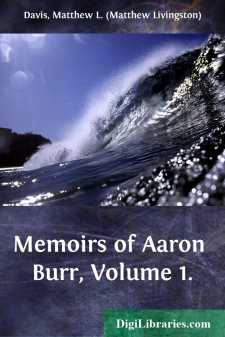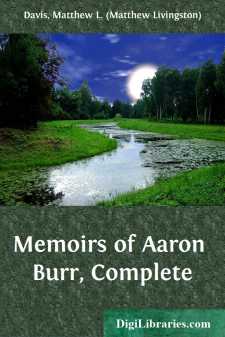Categories
- Antiques & Collectibles 13
- Architecture 36
- Art 48
- Bibles 22
- Biography & Autobiography 813
- Body, Mind & Spirit 142
- Business & Economics 28
- Children's Books 17
- Children's Fiction 14
- Computers 4
- Cooking 94
- Crafts & Hobbies 4
- Drama 346
- Education 46
- Family & Relationships 57
- Fiction 11829
- Games 19
- Gardening 17
- Health & Fitness 34
- History 1377
- House & Home 1
- Humor 147
- Juvenile Fiction 1873
- Juvenile Nonfiction 202
- Language Arts & Disciplines 88
- Law 16
- Literary Collections 686
- Literary Criticism 179
- Mathematics 13
- Medical 41
- Music 40
- Nature 179
- Non-Classifiable 1768
- Performing Arts 7
- Periodicals 1453
- Philosophy 64
- Photography 2
- Poetry 896
- Political Science 203
- Psychology 42
- Reference 154
- Religion 513
- Science 126
- Self-Help 84
- Social Science 81
- Sports & Recreation 34
- Study Aids 3
- Technology & Engineering 59
- Transportation 23
- Travel 463
- True Crime 29
Memoirs of Aaron Burr, Volume 2.
Description:
Excerpt
CHAPTER I.
Colonel Burr's study of the law [1] has been already briefly noticed. He brought to that study a classic education as complete as could, at that time, be acquired in our country; and to this was added a knowledge of the world, perhaps nowhere better taught than in the camp, as well as a firmness and hardihood of character which military life usually confers, and which is indispensable to the success of the forensic lawyer. He was connected in the family circle with _two[2] eminent jurists, who were at hand to stimulate his young ambition, and to pour, in an almost perpetual stream, legal knowledge into his mind, by conversation and by epistolary correspondence. The time he spent in his studies preparatory to his admission would be considered short at the present day; but (to use the language of another) "it is to be recollected that at that time there were no voluminous treatises upon the mere routine of practice to be committed to memory, without adding a single legal principle or useful idea to the mind, and which only teach the law student, as has been said of the art of the rhetorician, 'how to name his tools.' Burr, fortunately for his future professional eminence, was not destined to graze upon this barren moor. He spent his clerkship in reading and abstracting, with pen in hand, Coke and the elementary writers, instead of Sellon and Tidd; and learnt law as a science, and not as a mechanical art."
On the other hand, it has been said "that Colonel Burr was not a deep-read lawyer; that he showed himself abundantly conversant with the general knowledge of the profession, and that he was skilful in suggesting doubts and questions; but that he exhibited no indications of a fondness for the science, nor of researches into its abstruse doctrines; that he seemed, indeed, to hold it and its administration in slight estimation. The best definition of law, he said, was 'whatever is boldly asserted and plausibly maintained.' This sarcasm was intended full as much for the courts as for the law administered by them."
If Colonel Burr may have been surpassed in legal erudition, he possessed other qualifications for successful practice at the bar which were seldom equalled. He prepared his trials with an industry and forethought that were most surprising. He spared no labour or expense in attaining every piece of evidence that would be useful in his attacks, or guard him against his antagonist. He was absolutely indefatigable in the conduct of his suits. "He pursued (says a legal friend) the opposite party with notices, and motions, and applications, and appeals, and rearguments, never despairing himself, nor allowing to his adversary confidence, nor comfort, nor repose. Always vigilant and always urgent, until a proposition for compromise or a negotiation between the parties ensued. 'Now move slow (he would say); never negotiate in a hurry.' I remember a remark he made on this subject, which appeared to be original and wise. There is a saying, 'Never put off till tomorrow what you can do to-day.' 'This is a maxim,' said he, 'for sluggards....




